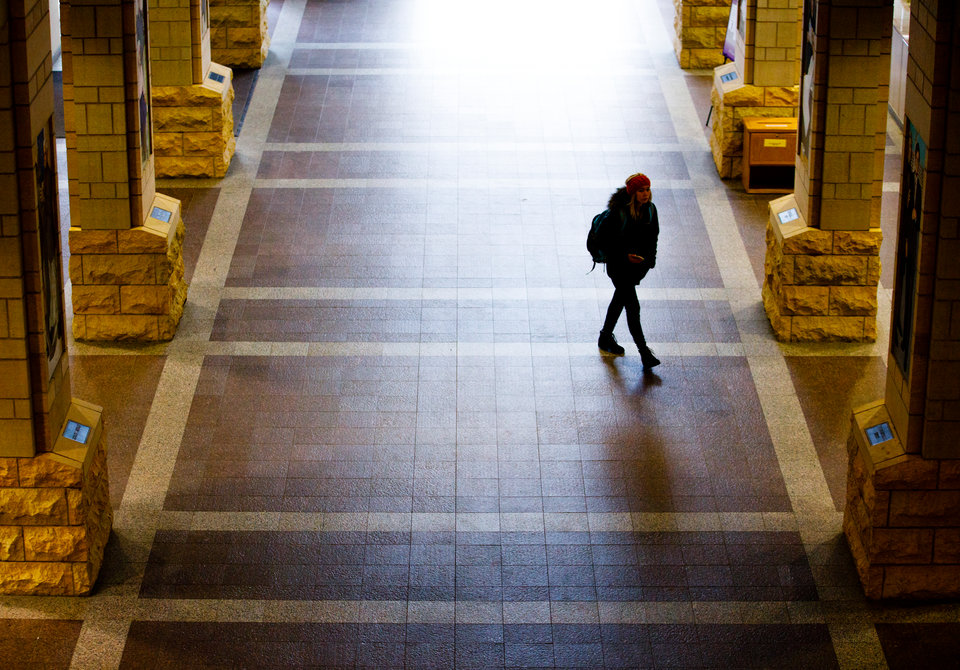During fall semester, seniors Katherine Bernal, Marc Natusch, Jack Cunningham and junior Ethan Finger researched mental health, as well as what could be done to improve it, on campus. Mental health, especially on college campuses, is widely discussed, but these students brought a business lens.
The team was tasked with finding a problem and a possible solution. While many of the business classes in the Schulze School of Entrepreneurship ask students to start a business, Entrepreneurship 350 focuses on innovation through a process called design thinking. Design thinking, or "human-centered design," puts a user instead of a product at the center of the design process. So, in this case, the team focused on the mental health needs of students.
"All of us really like design thinking a lot and realize it's a powerful tool to help people," Bernal said.
Researching mental health
With their task laid out, the team looked for a problem they could tackle at St. Thomas with the potential to help around the country.
"If there was a way for us to help other people deal with their problems or situations, it has a really deep meaning," Finger said.
They started by interviewing as many people on campus as possible. That often entailed walking into the Anderson Student Center and asking random students if they had used the mental health services on campus and, if they had, what their experience had been like. With the stigma that is often attached to discussions around mental health, the team had to precisely hone their communication skills.
"It's asking why," Bernal said. "You understand the underlying issue, not just what they're saying, but the meaning behind what they're saying."
In addition, they interviewed the people in charge of mental health resources at St. Thomas, including staff at Counseling and Psychology Services and at the Wellness Center. In total, they estimated they interviewed 50-60 community members.
After that, they narrowed their focus to an issue they could feasibly help with.
"It's to look at the problems and say, 'Let's throw more resources at them,'" Bernal said. "We had a challenge of trying to come up with a unique and creative idea that the university could actually provide. We didn't want to come up with something that couldn't ever be used."
They focused on the waiting list for Counseling and Psychological Services, which, like many providers in the industry, is long. The team zeroed in on the fact that at universities there are individuals who have mental disorders and mental crises, and would benefit from long-term counseling help; there are also individuals experiencing high levels of stress whose problems may be acute. Everyone goes on the same waiting list and is offered a spot when it becomes available.
One solution was to pull some of those high-stress, acute students from the waiting list. Ideally, then, the waiting list would become shorter, allowing for people with mental illness and crises to get into counseling faster. Another solution focuses on therapy rooms, which reduce anxiety.
At the end of the semester they were prototyping two types of rooms: a nature one, with natural light and plants intended to be more calming and rejuvenating; and a dark room, intended to be relaxing and dull the senses. St. Thomas students tested these prototypes and had high praise for the concept, they said.
Another added benefit of the therapy rooms is to build community around mental health, which could reduce some of the stigma.
"There's a space for it," Cunningham said. "There's strength in being around people dealing with similar things and banding together."
The team said staff was interested in their idea as they were conducting interviews, and are hopeful this is a plan that could be implemented at St. Thomas.
The value of an entrepreneurship degree
As the team members approach completion of their entrepreneurship program, they reflected on how it built on skills they had gained in previous classes and added value to their overall education.
"Everyone wants to talk about this design thinking because it's so full-bodied," Cunningham said. "You're seeing things from different angles, and it's really applicable to any problem and any industry that's human centered. I think it's been cool to get my feet wet in the concept of design thinking, and it's a great talking point when I talk to future employers and show my value and the value of my degree."
All agreed the value of their degree has been incredibly apparent in part because the alumni network is strong.
"Entrepreneurship is a tight-knit community," Finger said. "I'm starting to look for jobs, and I'm having coffee with three Tommies who are out doing really cool things in the community who want to talk to me because I'm in the program. The whole Tommie network is tight, but I think it's even more refined in entrepreneurship, and Minneapolis also has a really tight entrepreneurship community. It's cool how we feed into that."
Natusch emphasized how every entrepreneurship class has been hard work and that each one adds a new experiential-learning experience.
"Every time I have an entrepreneurship class, it brings out the best in me," Natusch said. "I ask, 'What am I going to learn?' Because I know I'm going to learn something."







